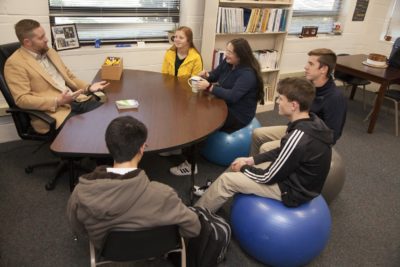Why LRC?

Bob Jones Academy exists to assist like-minded Christian parents in challenging students to love Jesus Christ, to embrace God’s truth, to exercise integrity, to pursue excellence, and to serve others.
Within that mission, BJA recognizes the value of all individuals as “fearfully and wonderfully made” by God (Psalm 139:14). With this in mind, BJA and the Learning Resource Center (LRC) are committed to partnering with the home to develop the spiritual and academic growth of students with verified disabilities, including specific learning disabilities, attention deficit/hyperactivity disorders, physical impairments or other recognized disabilities.
How does a student qualify for enrollment in the LRC?
Enrollment is limited in BJA’s LRC program. Preference is given to students who are already enrolled at BJA when the disability manifests itself. LRC is not available for part-time students.
Current professional testing verifying a learning disability or a statement from a physician to document a visual, hearing, or other health impairment (such as ADHD) is required for enrollment and/or continuation in the LRC. Testing must be dated within the past three (3) years in order to be considered current. Additional information may be obtained from an LRC teacher or the academic office. Permission to enroll in the LRC is granted by the Academy’s administration.
Does BJA use IEP’s?
Individualized Educational Programs (IEP’s) are legal documents for children with disabilities who are enrolled in a public school setting so that the school can satisfy certain laws and regulations that apply only to public education.
For qualifying students BJA creates an Individualized Student Plan (ISP). The content is similar to an IEP in documenting the student’s disability, as demonstrated by professional testing (see below for several) or other means as noted above, and includes reasonable classroom and testing accommodations planned for that school year. Parents meet annually with the LRC teacher and the student’s teacher(s) in order to review the updated ISP.
Child Find (Greenville County Schools); (864) 452-0093
Clarity: The Speech, Hearing, and Learning Center; (864) 331-1400. Clarity offers a discount for BJA families; be sure to tell them that you’re a BJA family when you initially contact them.
When you seek a diagnosis, consider also reviewing “Is Financial Help Available?” below for a form to be completed by the person who does the testing.
Teacher input may also be helpful in the process of seeing a diagnosis.
How does LRC work?
LRC classes generally meet daily, though some elementary LRC classes may meet four days each week.
In grades 1 and 2, students are assessed by an LRC teacher to identify those who would benefit from specialized reading instruction. A similar assessment is made in math in grade 2. A primary goal of the LRC Reading and LRC Math in grades 1 and 2 is to keep struggling students from falling behind so that they will be able to learn well in the regular classroom setting (without LRC support) beginning in grade 3.
The formal LRC placement process begins in grade 3. An elementary student who qualifies for LRC (see above) may be enrolled in LRC Math and/or LRC Reading. Students earn an academic grade for the course.
In grades 6 through 12, a student who qualifies for LRC (see above) may be enrolled in a class called LRC. Like other classes, LRC students earn a grade and at the high school level earns a standard high school credit. The LRC class is not subject-specific (Math/Reading) but instead provides accommodations as needed for each class in which a student is enrolled. Students are also encouraged in structured homework and developing good study skills.
Resources for LRC students (and others!) are available here.
What are the graduation requirements for LRC students?
Academy students with disabilities take the same required courses for their diploma as nondisabled students. However, for students (with or without disabilities) who are not quite able to succeed in the college-prep environment, BJA offers selected modified high school courses (labeled “general”) which lead toward a general diploma. Contact the academic office for details.
How much does LRC cost?
Tuition for LRC is included on our fees page.
Is financial help available?
Qualifying students may apply for scholarships or tuition tax credits through a South Carolina program called ExceptionalSC. To get started ask the professional who diagnosed your student with a qualifying disability to complete the Eligibility Form.
What if LRC is not enough?
For students who need more intervention than LRC (or the general-diploma high school courses, see above), several resources may be useful. Read more here for study resources, including tutoring resources. Parents may also want to see if Hidden Treasure Christian School, a nearby Christian school specifically designed for students with disabilities, may be a good fit for their student.